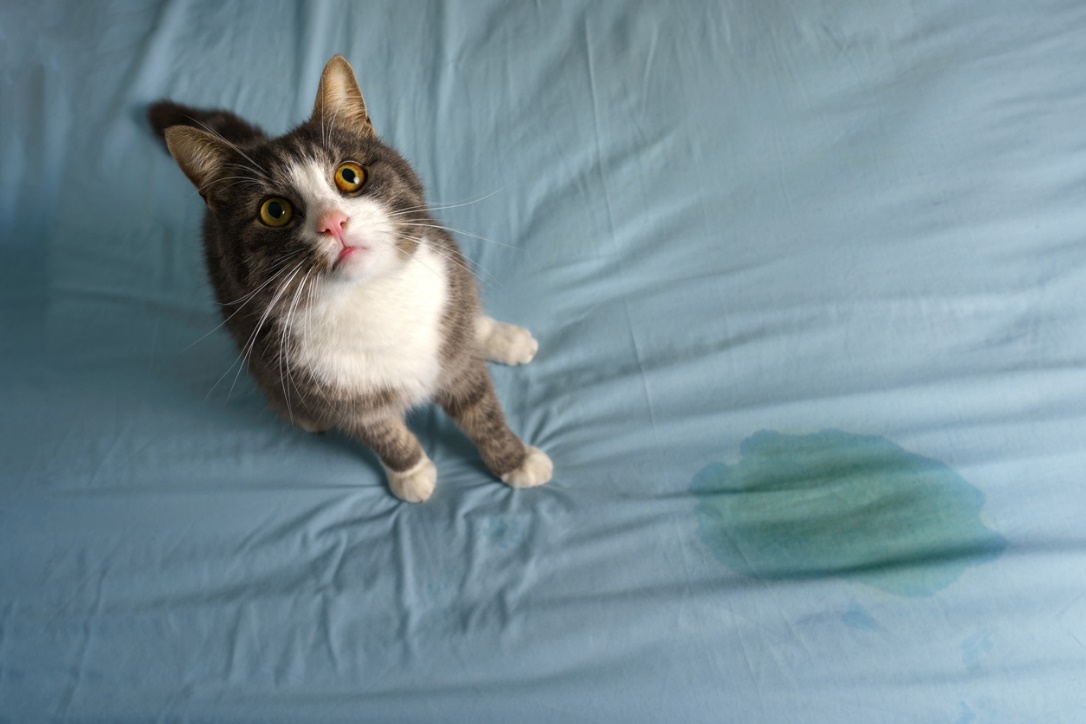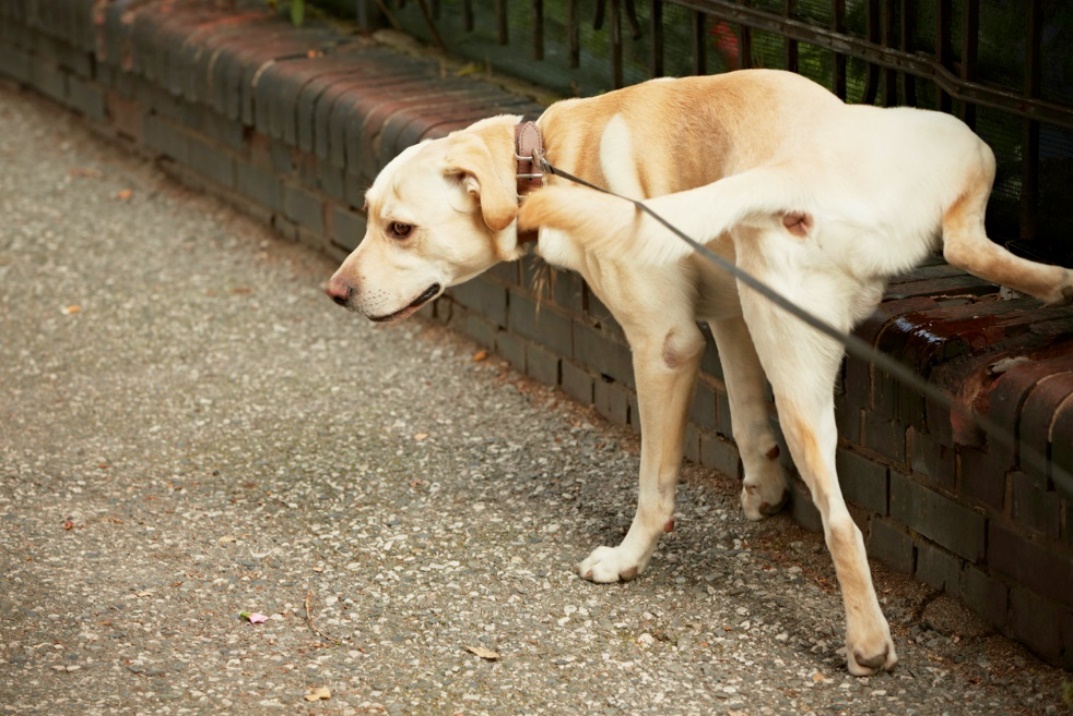As a pet parent, you know your pet best, so you are usually quick to notice changes in your pets’ habits — especially when it comes to the litter box or backyard potty breaks. If your cat is visiting the litter box more often, or your dog suddenly needs more bathroom breaks than usual, it is not just an inconvenience. Frequent urination can be a sign of underlying health problems that you should never ignore. Since September is Urology Awareness Month, it is the perfect time to talk about urinary health in pets and why it matters. At Advanced Pet Care Clinic, we know how important it is to catch these issues early so your pet stays healthy and comfortable.
Why Is My Cat Peeing More Than Usual?

Cats are notorious for hiding illness, so changes in their bathroom routine are often the first clue that something is not right. Common causes include:
- Urinary Tract Infections (UTIs): Bacteria can cause inflammation, pain, and frequent urination.
- Bladder Crystals or Stones: These can form in the bladder and lead to painful, frequent, or even blocked urination.
- Kidney Disease: More common in senior cats, kidney issues often cause increased thirst and urination.
- Diabetes: Excessive drinking and peeing may be early signs of feline diabetes.
Red flags to watch for in cats: straining in the litter box, crying when urinating, blood in the urine, or urinating outside the litter box.
Why Urinary Blockages in Male Cats Are a Medical Emergency
Male cats are especially prone to urinary blockages because their urethra is so narrow. Even a small amount of crystals, stones, or mucus can completely block the flow of urine.
A blockage is life-threatening within 24–48 hours and requires immediate veterinary care. Without treatment, toxins build up in the body, leading to kidney failure, electrolyte imbalances, and even death.
Warning signs of a blockage in cats include:
- Frequent, unproductive trips to the litter box
- Straining or crying out in pain when trying to urinate
- Producing only a few drops of urine or blood-tinged urine
- Sudden lethargy, hiding, or loss of appetite
Why Is My Dog Peeing More Than Usual?

Dogs may also show increased urination for reasons ranging from minor to serious. The most common include:
- Urinary Tract Infections (UTIs): Bacteria can cause inflammation, pain, and frequent urination.
- Bladder Crystals or Stones: These can form in the bladder and lead to painful, frequent, or even blocked urination.
- Kidney Disease: More common in senior cats, kidney issues often cause increased thirst and urination.
- Diabetes: Excessive drinking and peeing may be early signs of feline diabetes.
Red flags to watch for in dogs: frequent accidents indoors, needing to go out at night, visible discomfort when urinating, or changes in urine color.
Can Dogs Have Urinary Blockages Too?
Yes — though not as common as in cats, male dogs can develop blockages if a bladder stone becomes lodged in the urethra. This is also an emergency, as the dog cannot pass urine normally.
Warning signs in dogs may include:
- Straining or taking a long time to urinate with little to no urine output
- Repeated attempts to urinate, often with whining or restlessness
- Blood in the urine
- Sudden discomfort, pacing, or licking at the urinary area
Frequent Urination in Pets: When to Call Advanced Pet Care Clinic
If your cat or dog is peeing more than usual, do not wait it out. Even if they seem otherwise healthy, urinary issues can progress quickly and cause serious complications. A urinary blockage, especially in male cats, is a medical emergency that requires immediate care. At Advanced Pet Care Clinic, we are here to provide urgent care when your cat needs it most.
Our veterinarians may recommend:
- Urinalysis and bloodwork to check for infection, diabetes, or kidney disease.
- X-rays or ultrasound to detect stones or crystals.
- Prescription diets or medications to dissolve stones, fight infection, or manage chronic conditions.
How to Support Your Pet’s Urinary Health at Home
While veterinary care is always essential for diagnosis and treatment, there are steps you can take to support your pet’s urinary health:
- Encourage hydration: Provide fresh water daily. Cats may benefit from fountains or wet food to boost intake.
- Keep litter boxes and potty areas clean: Cats may avoid dirty litter boxes, and dogs may “hold it” if they’re not let out regularly, both of which can worsen problems.
- Feed a balanced diet: Special urinary diets can help prevent crystals or stones.
- Schedule regular checkups: Early detection of kidney disease, diabetes, or UTIs makes treatment more effective.
Bottom Line: Protecting Your Pet’s Urinary Health
If your cat or dog is peeing more than usual, do not dismiss it as just a quirk. Frequent urination in pets can signal conditions like urinary tract infections, bladder stones, kidney disease, or diabetes — all of which require veterinary attention.
The general rule is simple:
- Routine changes (like peeing more often, drinking more water, or having occasional accidents) mean you should schedule a veterinary appointment soon.
- Emergency signs (straining with little to no urine, crying out in pain, or complete inability to urinate) require immediate emergency care, especially in male cats.
It is also important to remember that pets are not being “bad” if they have accidents indoors or your cat urinates outside the litter box. Never punish your pet for peeing inappropriately — it will not fix the problem and may cause fear or stress, which can make urinary issues worse. Instead, recognize these behaviors as a sign your pet may be struggling and needs veterinary care.
Paying attention to your pet’s bathroom habits can save their life. This September, during Urology Awareness Month, start the habit of monitoring your cat or dog closely — and continue it as part of their regular care. If you notice anything unusual, call Advanced Pet Care Clinic right away. If it is after hours and your pet shows signs of an emergency, seek immediate care at an emergency veterinary hospital. Supporting urinary health helps prevent discomfort, avoid dangerous emergencies, and ensures your pet enjoys a longer, healthier life by your side.
Advanced Pet Care Clinic
4507 Algonquin Drive, Suite A
Cedar Falls, IA 50613

